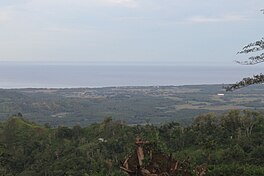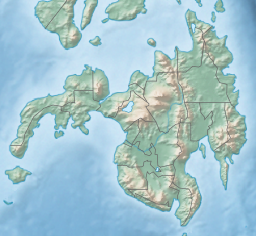Moro Gulf
The Moro Gulf is the largest gulf in the Philippines. It is located off the coast of Mindanao Island, and is part of the Celebes Sea. The gulf is one of the country's tuna fishing grounds.[1]
Geography
[edit]The gulf stretches between and is surrounded by the main section of Mindanao on the east, and the Zamboanga Peninsula of Mindanao on the west. The peninsula's major drainage goes towards the gulf.[2]
Sibuguey Bay and Illana Bay are its major bays.
Zamboanga City, which is an international port, is bound by the Gulf and Celebes Sea in the East.[3] Cotabato City, on the eastern coast, is another major port.
Earthquakes
[edit]The Moro Gulf is also an area of significant tectonic activity with several fault zones in the region capable of producing major earthquakes and destructive local tsunamis, such as the devastating 1976 Moro Gulf earthquake which killed over 5,000 people and left over 90,000 people homeless as it hit the west coast of Mindanao.
See also
[edit]References
[edit]- ^ Barut, Noel. "National Tuna Fishery Report - Philippines" (PDF). School of Ocean and Earth Science and Technology. Marine Fisheries Research Division National Fisheries Research and Development Institute. Retrieved May 4, 2015.
- ^ Carating, Rodelio B. (2014). Soils of the Philippines: World soils book series. Springer Science & Business. p. 61. ISBN 978-9401786829. Retrieved May 4, 2015.
- ^ "ZAMBOANGA PENINSULA". Department of Environment and Natural Resources. Archived from the original on August 15, 2018. Retrieved May 4, 2015.





